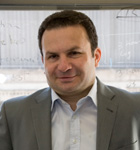
We started in 1965 as a janitorial-service company. We sold that business in 1989, but started a new version of it in 2008. Why? There had been a lot of consolidation in the janitorial-services industry, and several of our security-services clients told us that their vendors were unreliable. So, we hired in a senior-level person to rebuild that capability, taking us from zero to 45 million square feet of customer-service area in three years. In a cost-conscious customer segment, we are able to do it almost 100 percent green in equipment, materials, and processes, following US Green Building Council/LEED guidelines.
Both lines of business are labor-intensive because we are a service company. People are our most important asset—we don’t have patents on people. We made a strategic decision to invest in our people, and we make sure we maintain good communication with them.
Of course, they are distributed over many locations so our communications have to be sophisticated. We’ve also invested millions in new technologies for training and helping our people perform their jobs. For example, we were early adopters of a handheld PDA unit that collects all site-critical information. In our security-systems division, we partner with our clients to deliver new innovative technologies.
Relative to current economic conditions, we are contrarians and try not to cut people. Our businesses are somewhat recession resistant, but there are some clients who have gone out of business, and those who might reduce the scope or frequency of services or who ask to reduce our margins—even while our costs are not going down. But while most of our competitors have reduced their workforce, we have looked for efficiencies in other areas and found other cost-cutting opportunities.
We have even been able to follow an acquisitions strategy. Instead of spending money to create new markets, we look for “culturally mirrored” acquisitions. We purchase companies that are like us: good reputation, solid service delivery, good backroom operations. We ask, “Is it going to be a cultural fit? How do they feel and talk about their clients? Do they have the same passion for customer service?” In 2011 alone, we passed on a half-dozen companies for cultural reasons.
Still, we have to be open-minded, not so naive as to think we know it all. We learn from the firms we buy. One benefit of the recession is in recruiting. Security guards and cleaning personnel are easier to find right now. But for some reason we find it still very difficult to find good managers that fit within our culture. We have dedicated recruiters working in both areas to fill positions.
To protect our clients, many of whom are in the Fortune 500, we constantly monitor local and world events—terrorism, natural disasters, even disease outbreaks, and mass protests. This means we closely follow the news and social media, communicating daily with our employees, clients, and law-enforcement agencies.
Universal is also growing organically, winning new contracts over competitors. We believe it’s because we provide a personalized level of service, much like you would expect to find in a smaller, local firm. That means strong relationships with clients, except we can do it on a large scale. It provides a value-add, from the scale of our operations—in our training programs, communications technologies, and such. That happens as much with the security businesses as on the cleaning side.


